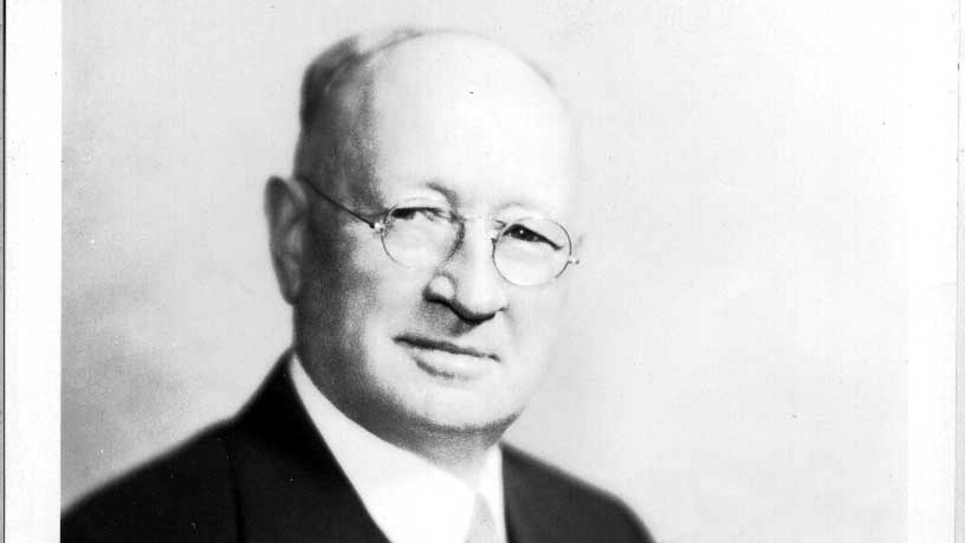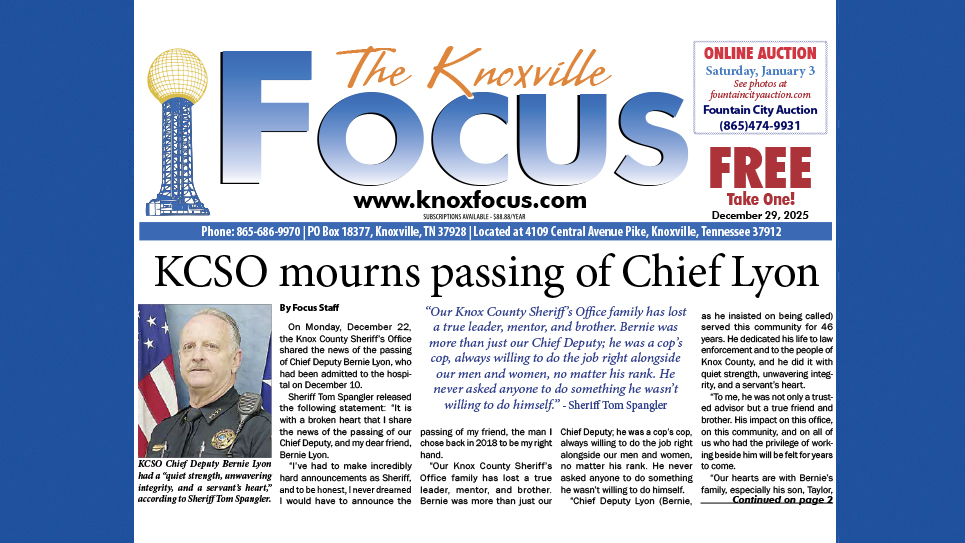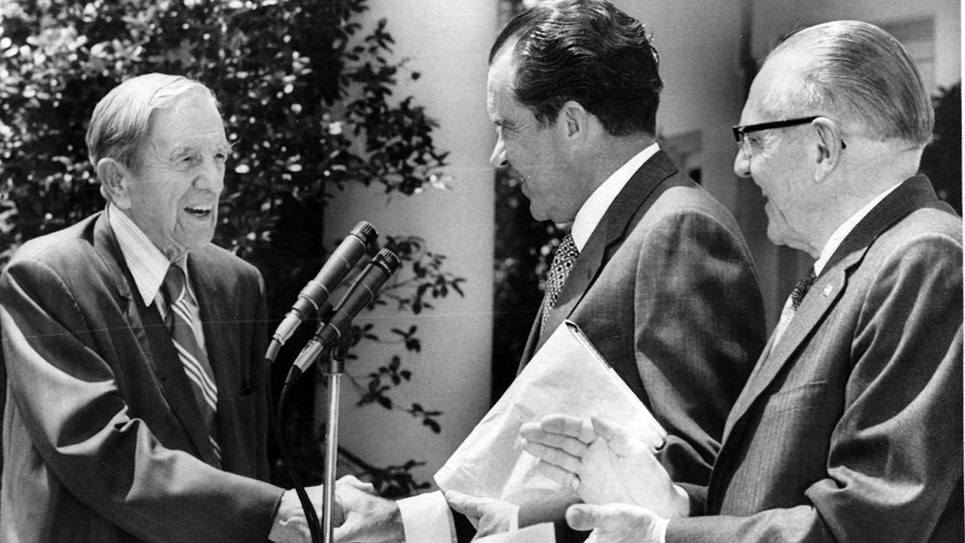The Fall of Congressman John Jennings, I
For the decade from 1940-1951, the congressman from Tennessee’s reliably Republican Second Congressional District was John Jennings. Bald on top, bespectacled, a very good speaker and an equally good lawyer who had once served as a chancellor, Jennings was commonly known as “Judge.” When J. Will Taylor died suddenly on November 14, 1939, Republicans in the Second District hastily called a convention to nominate a candidate to run in the special election being held in December. Jennings fought a hard contest with Erby Jenkins, also a lawyer practicing in Knoxville, to win the GOP nomination for Congress. The Democrats nominated perhaps the best candidate available to them, state Senator Hammond Fowler, who was young, vigorous and also a good orator at a time when being able to express a cogent thought mattered. Indeed, Jennings was considered one of the best platform speakers of his time and was known for his salty language.
Democrats took the race seriously and Senator Kenneth McKellar raised money for Fowler’s campaign. As the election returns came in on December 30, 1939, it was apparent John Jennings had won. The final tally showed Jennings with 60.16% and Fowler with 39.84% of the votes cast. Jennings sought a full two-year term in 1940 and beat Democrat Clay James by less than 10,000 votes, a percentage of roughly 56%. Two years later, Democrats nominated John T. O’Connor, the highly popular former mayor of Knoxville who had very nearly beaten J. Will Taylor in 1936. Unfortunately for O’Connor, 1942 was a good year for Republicans nationally, unlike 1936. Whereas Clay James had carried only one county in 1940, John T. O’Connor carried three, including Knox. Even then, the vote tally inside Knox County was very close. O’Connor won 8,171 votes as compared to 7,999 for Congressman Jennings.
John Jennings never managed to truly entrench himself inside the Second District, nor were his winning margins, with a couple of exceptions, outstanding. Jennings initially got along well with the only other congressional Republican from Tennessee, Congressman Carroll Reece from the First District, but eventually a rivalry developed between the two. Jennings was a vocal and strong supporter of Thomas E. Dewey, the governor of New York, for the 1944 GOP presidential nomination. Reece was more friendly to the candidacy of Ohio Governor John W. Bricker, who was considered more conservative than Dewey. Reece voluntarily gave up his seat in the House of Representatives in 1946 to assume the chairmanship of the Republican National Committee. Reece was by far the most prominent Tennessee Republican on the national stage, which likely caused additional friction between him and Judge Jennings. The successor to Reece in Tennessee’s First District was Dayton Phillips, who was not affiliated with the powerful Reece organization and was philosophically distant from his predecessor. Phillips was one of the very few Republicans in the House of Representatives who had voted against the Taft – Hartley Bill, as well as voting to uphold President Truman’s veto of the Taft – Hartley legislation. Carroll Reece was deeply appalled by Phillips’ apostasy. While Jennings was a supporter of Taft–Hartley, the congressman aligned himself with Phillips in a bid to supplant the Reece organization. Reece had been Tennessee’s Republican National Committeeman since 1939 when he had picked up the title following the death of J. Will Taylor. Reece was also closely allied with Guy Smith, editor of the Knoxville Journal, which was a proud and vociferous Republican newspaper. If the Republican Party had an official press organ in the Volunteer State, it was the Journal under Guy Smith. Indeed, Guy Smith was the chairman of Tennessee’s Republican Party during the 1948 campaign. Once again, Congressman John Jennings was strongly backing Tom Dewey, while Carroll Reece was thought to be friendly to the candidacy of U.S. Senator Robert A. Taft of Ohio. Reece had tried very hard to remain neutral as he was still chairman of the RNC, but once Dewey was nominated, the New York governor replaced Reece with Pennsylvania Congressman Hugh Scott.
Almost nobody thought President Harry Truman had a snowball’s chance in hell of beating Tom Dewey in the general election. The Republicans had won large majorities in both the House and Senate under Carroll Reece’s leadership with the slogan “Had Enough?” which summarized the American people’s frustrations with the deprivations during the Second World War. GOP candidates campaigned confidently, and John Jennings appeared to be in the catbird seat as it would be he, rather than Carroll Reece, who would control federal patronage under a Dewey Administration.
Like most everyone else, Carroll Reece thought 1948 would be an even bigger Republican year than 1946. Tennessee’s Democratic Party was shattered by brutal primary battles for both the gubernatorial and senatorial nominations. Governor Jim Nance McCord, who had instituted the sales tax, found that not even the teachers, who had benefitted the most from the tax (it had largely been dedicated to education), were grateful. While Tennesseans liked the free textbooks, they didn’t care for the tax and ousted McCord in favor of former Governor Gordon Browning, who had left office in 1938 as one of the most badly beaten chief executives in Tennessee’s history.
The contest for the Democratic nomination for the United States Senate was a three-way contest between Chattanooga Congressman Estes Kefauver, incumbent Senator Tom Stewart and John Mitchell. E. H. Crump, master of the Shelby County political organization, had informed Senator Stewart his political machine would no longer support him. Apparently, the Memphis Boss had believed Stewart would meekly retire. Instead, the senator fired off an incandescent blast in Crump’s direction and announced he was running again. Crump had settled his support on John Mitchell, who was an unknown circuit court judge from Cookeville. Crump had never even met Mitchell. Senator McKellar did not think well of Crump dumping his junior colleague and doubted the wisdom of supporting Mitchell even more. It soon became readily apparent Kefauver was fast gaining ground and Crump quite nearly pulled his support from Mitchell, thinking to back Stewart once again. The Kefauver campaign announced that was precisely what the Memphis Boss proposed to do, which caused Crump to jerk back his hand and huff that he had never withdrawn his support from a candidate once given. Kefauver won with only a plurality of the votes cast, followed by Senator Stewart. Judge Mitchell carried only his home county of Putnam and Crump’s Shelby County. Years later, Kefauver’s campaign manager Judge Charles Neese told me with a snort that had Crump simply stuck with Stewart, Kefauver would have been unable to win.
For the first time in more than a decade, the McKellar-Crump alliance had been rebuffed in a statewide election. Carroll Reece saw an opportunity and became a candidate for the United States Senate. The truth of the matter is the GOP only fielded one truly serious GOP candidate for the U S. Senate since Tennesseans first began popularly electing senators in 1916. That year former Governor Ben W. Hooper faced then-Congressman Kenneth D. McKellar and won 45% of the vote. Guy Smith and Tennessee Republicans, with the Democrats being blown into pieces both nationally and in Tennessee, put together what they believed was an excellent ticket: Carrol Reece for U.S. senator and Roy Acuff for governor. Even then Roy Acuff was a massively popular entertainer in every venue of the time: radio, motion pictures and the stage.
Nationally, Democrats had splintered; Truman was the regular Democratic nominee, while South Carolina Governor Strom Thurmond was the nominee of the States’ Rights Democrats (“Dixiecrats”), and former Vice President Henry A. Wallace was the Progressive Party candidate. Many Tennessee Democrats were nervous by the ominous silence emanating from Memphis, where E. H. Crump had uttered not a peep about the Browning-Kefauver ticket. Crump made his fellow Democrats even more nervous when he issued a statement endorsing Strom Thurmond over Harry Truman. Senator McKellar, saying pointedly he was a Democrat and remained a Democrat, endorsed President Truman and the Democratic ticket.
Carroll Reece genuinely believed there was good reason to believe Crump would bolt the state ticket as well as the national. Reece thought with the support of Crump and Shelby County he and Roy Acuff stood a good chance of winning the election, especially with the expected triumph of Governor Dewey. There were more than a few prognosticators of the day who thought Dewey had a better-than-fair chance of carrying Tennessee as well. The Reece-Acuff ticket began a tour of Tennessee, which featured Acuff and his Smoky Mountain Boys performing, followed by a speech from Reece. Democrats were jolted by the fact Reece and Acuff were attracting audiences well into the thousands wherever they campaigned.
Election Day popped the bubble of the pollsters who, almost to a man, had predicted the election of Thomas E. Dewey. So, too, did Republicans take a beating in the congressional contests, losing nine seats in the U.S. Senate and 75 seats in the House of Representatives. Carroll Reece and Roy Acuff won roughly a third of the votes in their races for the U.S. Senate and the governorship. Worse still, the returns inside Tennessee’s Second Congressional District showed Reece and Acuff running behind Tom Dewey’s showing. Nobody was more stunned by the returns from Tennessee’s Second Congressional District than Guy Smith. Where Tom Dewey had carried Knox County with more than 21,000 votes, Gordon Browning had tallied better than 23,000 over Roy Acuff. Estes Kefauver won Knox County with 20,000 votes while both Carroll Reece and Roy Acuff totaled under 16,000. The ordinary Republican vote was down in both the First and Second Districts and Guy Smith cast a gimlet eye in the direction of Congressmen Dayton Phillips and John Jennings. Smith insisted it was plain as day the two had undercut Reece and Acuff.
Jennings had been challenged inside the GOP primary in 1948 by Hobart Atkins, a local attorney. Atkins had pressed Jennings hard, losing by only 2,407 votes. The failure of Thomas E. Dewey to win the presidency was a major blow to John Jennings, who was perhaps the New York governor’s most prominent supporter south of the Mason-Dixon Line.
The seeds had been planted and they began to grow following the 1948 election. Guy Smith was absolutely determined to remove both John Jennings and Dayton Phillips from the House of Representatives.
Phillips, a bachelor at the time, had few or no hobbies aside from his job and had been quite popular with working people throughout the First Congressional District. Twice before Dayton Phillips had beaten candidates supported by the powerful Reece organization inside the Republican primaries. It quickly became readily apparent only one candidate could beat Dayton Phillips, if he could be beaten at all. Having been defeated for the Senate and there no possibility of any kind of Cabinet position inside a GOP administration, the only option available to Carroll Reece for continued government service was to try and reclaim his seat in the U.S. House of Representatives.
Guy Smith had several effective weapons at his disposal in his quest to remove Congressman John Jennings from public office. Smith was still chairman of Tennessee’s Republican Party and had ready access to donors to fund a campaign. Guy Smith was closely allied with the Reece organization and most importantly, he had the Knoxville Journal at his fingertips. John Jennings never got any good publicity from the Journal following the 1948 election; oftentimes, the publicity he received surpassed the negative to the downright savage. Editor Smith didn’t give a fig who knew he was after the political scalps of John Jennings and Dayton Phillips. The Journal would lavish praise upon Carroll Reece and conversely ladle out acid in print on the writhing bodies of Congressmen Jennings and Phillips.
It became abundantly clear to both Dayton Phillips and John Jennings they were in a fight for their political lives. It was a contest where no quarter would be asked, and none given.
© 2025 Ray Hill







